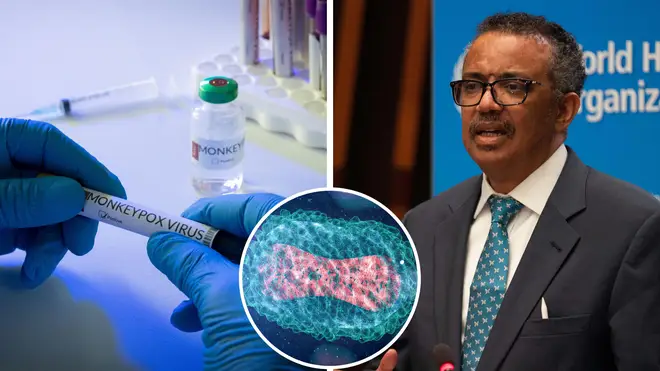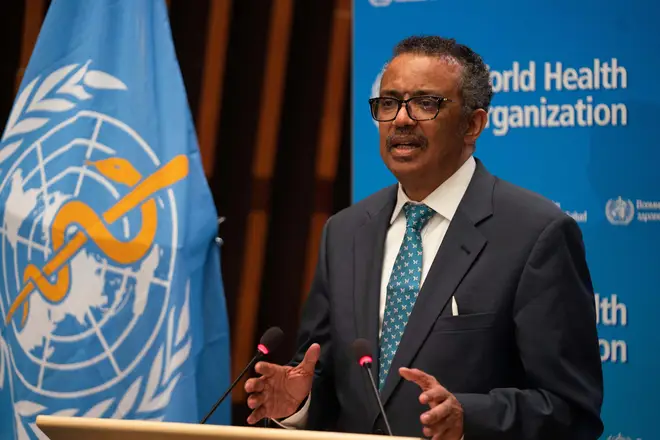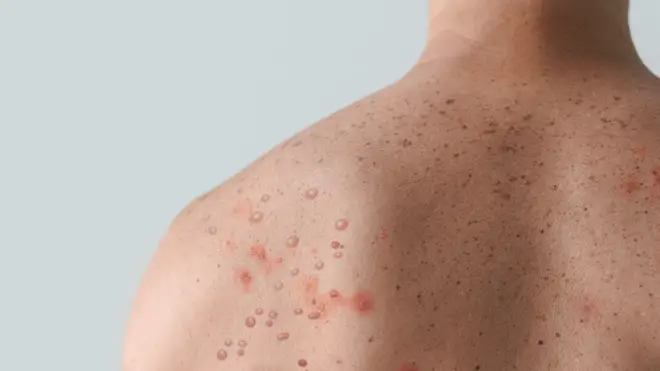
James Hanson 4am - 7am
23 July 2022, 15:22 | Updated: 23 July 2022, 17:31

Monkeypox has been declared a global emergency by the World Health Organisation.
More than 2,000 cases have been found in the UK alone since the first instance in May, but the risk to the public has been considered low by British health authorities.
Some have questioned whether the disease is serious enough to warrant the classification, given that most people recover without needing medical attention, although the lesions may be painful.
But the WHO said the expanding outbreak in more than 70 countries is an "extraordinary" situation that now qualifies as a global emergency.
Read more: Monkeypox outbreak: What is the virus and how does it spread?
Read more: Monkeypox to be renamed after accusations it's racist
WHO director-general Tedros Adhanom Ghebreyesus made the decision to issue the declaration despite a lack of consensus among experts serving on the UN health agency's emergency committee.
It is the first time the chief of the UN health agency has taken such an action.
Mr Tedros said: "We have an outbreak that has spread around the world rapidly through new modes of transmission about which we understand too little and which meets the criteria in the international health regulations.
"I know this has not been an easy or straightforward process and that there are divergent views among the members" of the committee, he added.

The UN health agency's declaration could spur further investment in treating the once-rare disease, although it may also worsen the scramble for scarce vaccines.
Although monkeypox has been established in parts of central and west Africa for decades, it was not known to spark large outbreaks beyond the continent or to spread widely among people until May, when authorities detected dozens of epidemics in Europe, North America and elsewhere.
Declaring a global emergency means the monkeypox outbreak is an "extraordinary event" that could spill over into more countries and requires a coordinated global response.

Monkeypox won't 'spread anywhere near as widely as Covid'
The WHO previously declared emergencies for public health crises such as the Covid-19 pandemic, the 2014 West African Ebola outbreak, the Zika virus in Latin America in 2016 and the ongoing effort to eradicate polio.
The emergency declaration mostly serves as a plea to draw more global resources and attention to an outbreak.
Past announcements have had a mixed impact, given that the UN health agency is largely powerless in getting countries to act.
Read more: Gay and bisexual men to be offered monkeypox vaccine as virus spreads
Read more: High risk contacts of UK monkeypox cases urged to self-isolate for 3 weeks
Last month, the WHO's expert committee said the worldwide monkeypox outbreak did not yet amount to an international emergency, but the panel convened this week to re-evaluate the situation.
According to the US Centres for Disease Control and Prevention, more than 16,000 cases of monkeypox have been reported in 74 countries since about May.
To date, monkeypox deaths have only been reported in Africa, where a more dangerous version of the virus is spreading, mainly in Nigeria and Congo.
In Africa, monkeypox mainly spreads to people from infected wild animals like rodents, in limited outbreaks that typically have not crossed borders.
In Europe, North America and elsewhere, however, monkeypox is spreading among people with no links to animals or recent travel to Africa.

WHO's top monkeypox expert, Dr Rosamund Lewis, said this week that 99 per cent of all the monkeypox cases beyond Africa were in men and that of those, 98 per cent involved men who have sex with men.
Experts suspect the monkeypox outbreaks in Europe and North America were spread via sex at two raves in Belgium and Spain.
Michael Head, a senior research fellow in global health at Southampton University, said it was surprising the WHO had not already declared monkeypox a global emergency, with the conditions arguably having been met weeks ago.
Read more: Dover set to be even busier than Friday's 'critical incident' as port boss blames Brexit
Read more: Boris gets to grips with machine guns as he preps troops to take on Putin's forces
Some experts have questioned whether such a declaration would help, arguing the disease is not severe enough to warrant the attention and that rich countries battling monkeypox already have the funds to do so.
Mr Head said: "I think it would be better to be proactive and over-react to the problem instead of waiting to react when it's too late."
He added that the WHO's emergency declaration could help donors like the World Bank make funds available to stop the outbreaks both in the West and in Africa, where animals are the likely natural reservoir of monkeypox.

In the US, some experts have speculated whether monkeypox might be on the verge of becoming an entrenched sexually transmitted disease in the country, like gonorrhoea, herpes and HIV.
Dr Albert Ko, a professor of public health and epidemiology at Yale University, said: "The bottom line is we've seen a shift in the epidemiology of monkeypox where there's now widespread, unexpected transmission.
"There are some genetic mutations in the virus that suggest why that may be happening, but we do need a globally-coordinated response to get it under control."
Dr Ko called for testing to be scaled up rapidly, saying that, similar to the early days of Covid-19, there were significant gaps in surveillance.
"The cases we are seeing are just the tip of the iceberg," he said.
"The window has probably closed for us to quickly stop the outbreaks in Europe and the US, but it's not too late to stop monkeypox from causing huge damage to poorer countries without the resources to handle it."
In the US, officials estimate that 1.5 million men are at high risk of being infected.

Caller, who caught polio in 1957 at the age of five, speaks to LBC
Dr Placide Mbala, a virologist who directs the global health department at Congo's Institute of National Biomedical Research, said he hoped any global efforts to stop monkeypox would be equitable.
Although countries including Britain, Canada, Germany and the US have ordered millions of vaccine doses, none have gone to Africa.
"The solution needs to be global," Dr Mbala said, adding that any vaccines sent to Africa would be used to target those at highest risk, like hunters in rural areas.
"Vaccination in the West might help stop the outbreak there, but there will still be cases in Africa," he said.
"Unless the problem is solved here, the risk to the rest of the world will remain."